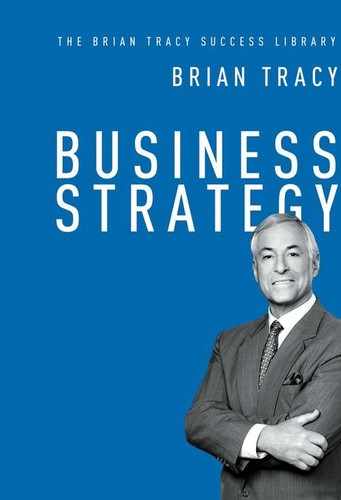Choose Your Competition
Choosing your strategy means choosing your competitor. Your competitor determines your level of sales, your prices, your profitability, your market share, and how fast or how slow you grow.
In warfare they say that no strategy is possible without consideration of the enemy—knowing who the enemy is and what the enemy is likely to do. It is the same in business. In Michael Porter’s work on competitive advantage at Harvard, he points out that competitive response to your marketing activities, or what your competitors are likely to do, must be a primary consideration in all of your strategic planning.
Who or what is your competitor for your product or service today? Who are your main competitors? Who are your smaller competitors?
What else is your competitor? Since you are asking a potential customer to give you a certain amount of money in order to acquire a certain benefit or advantage, where else can your potential customer spend that same amount of money to get an equal or better advantage or benefit? This is an extremely important question.
When I was doing work with Carnival Cruise Lines, I asked the company’s executives what other cruise lines they competed against. They explained to me that they did not compete against other cruise lines. The cruise business was growing and continued to grow as more and more people took more and more cruises worldwide.
Their major competitor, they explained, was “land-based vacations,” which were the major substitute or alternative to ship-based vacations. Their job was to position a cruise as being superior to a vacation on land anywhere.
Any Alternate Use of Funds
Any alternate expenditure of the amount of money that you request from your customer is also a competitor. As Sam Walton once said, “We have only one boss. That is the customer. And customers can fire us at any time just by deciding to spend their money somewhere else.”
Where else could a potential customer of yours spend the same amount of money to get an equal or greater level of benefit or satisfaction? How can you position yourself so that the product or service you offer is a superior choice to a customer who has the option to spend that money somewhere else?
Choose Your Competitor
Choosing your product or service means choosing your competitor as well. Often, you can change your business by deciding to compete against another organization. Changing your competitor can lead to changing your business completely.
Once you have identified your major and minor competitors, sit down and analyze both their strengths and weaknesses. Analyze your strengths and weaknesses. Where are you vulnerable to your competitors? Where are they vulnerable to you?
Position Yourself as the Superior Choice
How could you position your products or services in such a way that they are clearly superior to those of your competitors? What could you do more of or less of to improve the attractiveness of your offering in comparison to your competitors? What could you start doing (or stop doing) to make your products or services more appealing than your competitors?
Resolve to be objective in answering these questions. Don’t just tell yourself that you are better than your competitors. Sit down and write out carefully itemized answers to these questions. Then do market research among customers and prospective customers to make sure that you are correct in your conclusions.
The only real test of the accuracy of your conclusions is a market test. You only know for sure that you are doing and offering the right combination of benefits and prices when you enjoy a steady increase in sales and profitability in your business.
